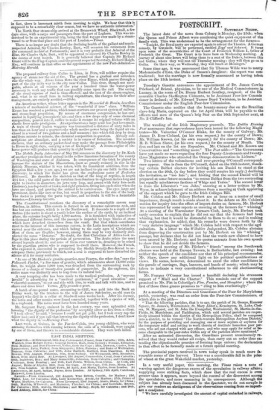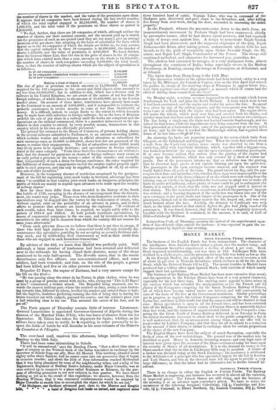In a very useful paper, this morning, the Times raises
a note of warning against the dangerous excess of the speculation in railway affairs; supplying some striking facts, which show that the real excess is even greater than it appears, more beyond the control of the discreetest among the speculators, and more menacing in its consequences. Although the subject has already been discussed in the Spectator, we do not scruple to give our readers an abridgment of the observations coming from so import- ant a coadjutor.
" We have carefully investigated the amount of capital embarked in railways, the number of shares in the market, and the value of the premiums upon them. It appears that 44 companies have been formed during the last twelve months; of which the total capital engaged is 35,510,0001., the number of shares is 1,086,650, and the total value of the premiums on those shares as quoted is 3,559,0001.
" We find, further, that there are 58 companies, of which, although neither the number of shares, nor their nominal amount, nor the amount paid up is stated, yet the premiums of such as are quoted (and they are not many) give an average premium of 61. per share: but, adopting as the basis of calculation the facts which appear as to the 44 companies of which the details are before us, we may assume that the capital embarked in these 58 companies is 46,490,000/., the number of shares 1,413,000, and the value of premiums is 4,641,0001. We know further, from the General Share List, that the rise in the price of shares in the 27 compa- nies which have existed more than a year, amounts on the whole to 13,491,0001.; the number of shares in such companies exceeding 9,100,000; the total result, then, is, that the number of railway-shares which are the subject of speculation is as follows—
In 27 old companies 9,100,000
In 44 companies established within twelve months 1,086,650
In 58 new companies 1,413,000
Making a total of shares of 11,599,650 The rise of price or premium on which amounts to 15,990,0001. The capital required for the 102 companies in the second and third classes alone amounts to not less than 82,000,000L; but in addition to this, which has r eference only to railways in the United Kingdom, we are aware of the names of not less than 20 foreign railways, of which shares to the amount of 10,100,0001. are in the London market alone. On account of these latter, remittances have already been made to the Continent to an amount of 3,000,0001.; and it isimpossible to estimate the probable remittances in twelve months to come at less than 10,000,0001. of money. It is difficult, indeed, to assign limits to the extent to which demands may be made here with reference to foreign railways; for as the laws of Belgium prohihit the sale of any share in a railway until the works are completed and the operations on the railroad commenced, there is a manifest inducement to the spe- culator in that country to extend, by every possible means, transactions in this country which in his own are effectually prevented." The printed list returned to the House of Commons, of persons holding shares in the several railways submitted to Parliament, to an amount exceeding 2,0001., which includes women and subordinates in official situations as subscribers for such enormous sums as 50,0001. to 600,0001., shows how few are possessed of the means to realize their engagements. The list of subscribers under 2,0001. would very likely prove to be equally fictitious; and speculations in foreign railways stand in the same category. From these facts two circumstances are evident,— first, that the demand for payments on shares of foreign railways must create at an early period a pressure on the money-li arket of this country; and secondly, that, independently of such a drain for foreign remittance, the sums required for the fialfilment of domestic engagements exceed the surplus capital properly appli- cable to such purposes, and can only be supplied, if supplied at all, by an exten- sive sale of other securities."
Moreover, in the temporary absence of restriction occasioned by the postpone- ment of the bill for regulating joint-stock banks in Scotland, advantage has been taken "to establish in that country joint-stock banks on dangerous principles, the profits of which are mainly to depend upon advances to be made upon the security of railway shares." How tar these facts differ from those recorded in the history of the South Sea bubble of 1720, excepting in the absence of encouragement from the Govern- ment, the reader mayjudge. Those even who deem themselves moderate in their speculations may be dragged into the vortex by the recklessness of others, who, without capital, exist on the probability of an advance in prices, and in their efforts to promote that advance are hastening the explosion. " If evidence of such results, taken from later times, be required, we might safely refer to the periods of 1825-6 and 1835-6. At both periods inordinate speculations, by means of commercial companies in the one case, and by investments in foreign securities in the other, led to disasters from which the country did not recover for some years afterwards." " From such grievous disasters we believe that there is yet time to escape, if those who bold high stations in the commercial world will only decidedly dis- countenance this speculative gambling by not accepting as security fictitious rail- way stock, and by withholding their countenance as well as their credit from those who are engaged in such hazardous transactions."



























 Previous page
Previous page